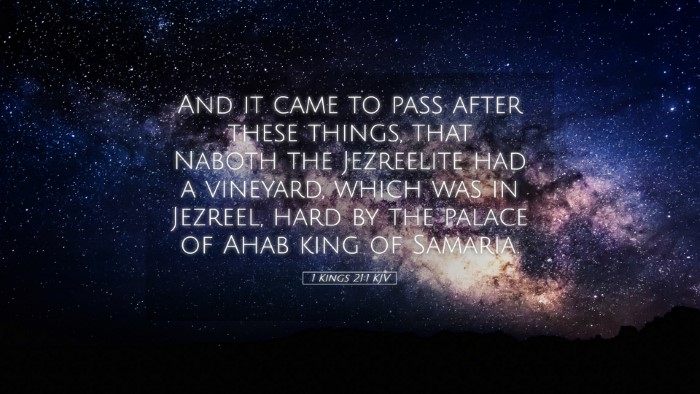Commentary on 1 Kings 21:1
Verse Context: 1 Kings 21:1 states, “And it came to pass after these things, that Naboth the Jezreelite had a vineyard, which was in Jezreel, hard by the palace of Ahab king of Samaria.” This verse sets the stage for one of the most tragic and morally complex narratives in the Old Testament, intertwining themes of greed, power, and injustice.
Summary and Insights
Historical Background
Naboth's vineyard is located in Jezreel, a place significant not only for its agricultural value but also for its close proximity to royal authority under King Ahab. This geographical context emphasizes the vulnerability of the common man against the ambitions of those in power. According to Matthew Henry, the king's desire was not merely for land, but for dominion and self-satisfaction.
Adam Clarke highlights the cultural importance of land ownership in ancient Israel, where a vineyard was a familial legacy, representing sustenance and stability. Naboth’s refusal is thus not just a personal stand against Ahab, but a defense of Israelite heritage and law.
The Characters Involved
Ahab: The character of Ahab, described in previous chapters as a king with a penchant for idol worship and moral compromise, here represents the archetype of corruption and greed. His desire for Naboth's vineyard reveals not only personal ambition but also a broader critique of kingship devoid of divine obedience.
Naboth: On the other hand, Naboth embodies integrity and steadfastness against moral corruption. His lineage and faithfulness to God’s laws are highlighted in the refusal to sell the vineyard. Albert Barnes notes that Naboth acts not merely as an individual but as a representative of God's covenant community.
Thematic Elements
- Greed and Power: Ahab’s character illustrates how greed can lead to unethical actions, as he is willing to resort to manipulation and oppression to acquire what he desires.
- Legacy and Family: Naboth’s vineyard speaks to the deep connection between land, family, and inheritance in Israelite culture, emphasizing that one's identity is tied to one’s possessions.
- Moral Integrity: Naboth’s steadfastness serves as a reminder of the importance of remaining faithful to God's commandments, even when faced with overwhelming pressure.
Theological Reflections
This account prompts critical theological reflection on the nature of justice and righteousness in the face of injustice. It poses questions about the responsibilities of leadership and the implications of moral compromise. Matthew Henry states that the narrative vividly illustrates the tension between divine justice and human oppression, calling believers to consider their own ethical stances in light of scripture.
Moreover, Albert Barnes suggests that this account serves as a sobering reminder of the potential consequences of unchecked ambition and abuse of power, aligning with biblical themes warning against greed and covetousness.
Lessons for Today's Believers
For pastors and theologians today, the narrative surrounding Naboth’s vineyard challenges the church to stand firm against societal pressures that conflict with biblical principles. The integrity displayed by Naboth serves as an example for Christians navigating similar ethical dilemmas in contemporary contexts, particularly regarding social justice and the protection of the marginalized.
Moreover, Ahab's wrongful pursuit of Naboth’s possession can evoke reflections on leadership within the church and community, urging leaders to prioritize justice and righteousness over personal gain.
Conclusion
The events of 1 Kings 21:1 offer profound insights into the complexities of human motivation and the realities of societal structures. Through the lens of various public domain commentaries, we are invited to engage deeply with the text, applying its lessons to our lives as we strive to embody the values of integrity, justice, and faithful stewardship in a world often marked by greed and moral compromise.


